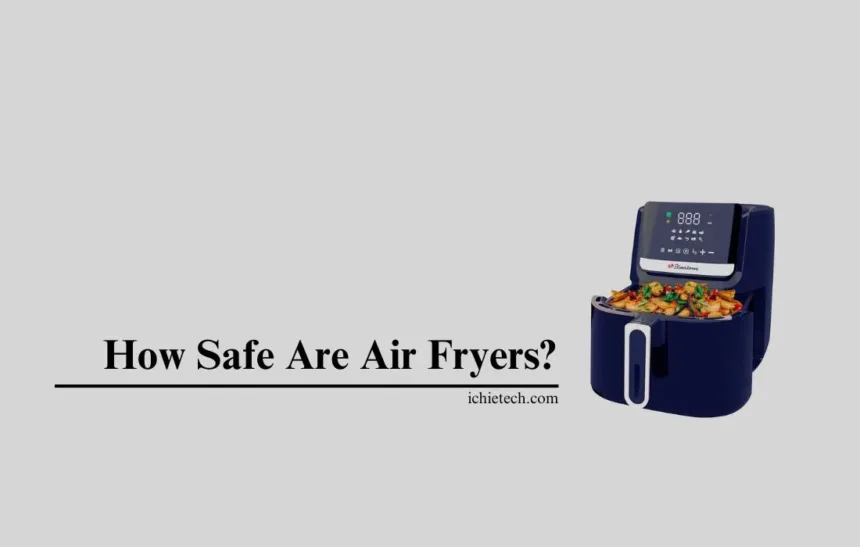Air fryers have become a staple in many kitchens, providing a convenient and healthier way to enjoy fried foods without the guilt. These countertop appliances use hot air circulation to cook food, mimicking the crispiness of deep-frying while significantly reducing the amount of oil needed. As air fryers continue to gain popularity for their efficiency and versatility, it’s important to explore the air fryer health benefits.
This article on IchieTech discusses safety features, potential risks, common misconceptions, and comparisons to traditional cooking methods, and offers tips for the safe use of air fryers. This information can help users make informed decisions about incorporating this cooking appliance into their kitchen.
What Is an Air Fryer and How Does It Work?
An air fryer is essentially a small convection oven. It uses rapid air circulation technology to cook food. A heating element warms the air inside the fryer, while a high-powered fan distributes the hot air evenly around the food. This process creates the Maillard reaction, giving food that crispy, golden texture similar to deep frying but with much less oil.
Comparing Air Fryers to Traditional Frying Methods
Traditional deep frying requires food to be submerged in hot oil, which can lead to high calorie content and health risks from excessive fat consumption. Air fryers, on the other hand, use little to no oil. This makes them a healthier alternative for preparing foods like French fries, chicken wings, and more.
Common Misconceptions About Air Fryers
Many believe air fryers are entirely oil-free, but some recipes still require a light coating of oil for optimal texture. Another misconception is that air fryers cook food faster than ovens. While they are efficient, their cooking times are comparable to standard ovens for many dishes.
Are Air Fryers Safe for Everyday Use?
One concern with air fryers is the materials used in their construction. Many models feature non-stick coatings made from materials like polytetrafluoroethylene (PTFE), which can release toxic fumes if overheated. To minimize this risk, choose models with ceramic or BPA-free coatings.
Temperature Control and Overheating Risks
Most air fryers come with built-in safety features like automatic shut-off mechanisms to prevent overheating. However, improper use or blocked vents can still pose fire hazards. Always follow the manufacturer’s guidelines and avoid overcrowding the fryer basket, as this can lead to uneven cooking and overheating.
Electrical Safety
Since air fryers are electrical appliances, they should be used on a stable, heat-resistant surface away from water. Regularly check the power cord for damage, and never use an air fryer with a compromised cord. It’s also a good idea to plug the fryer into a grounded outlet for added safety.
Can Air Fryers Truly Make Cooking Healthier?
Air fryers can reduce calorie intake by cutting back on oil usage. For instance, a serving of deep-fried French fries can contain up to 17 grams of fat, while air-fried fries have as little as 4 grams. This makes them a heart-healthy option for those looking to enjoy fried foods without the guilt.
Examining Potential Risks
One potential health concern with air fryers is the formation of acrylamide, a chemical compound that can develop when starchy foods are cooked at high temperatures. While acrylamide is also found in other cooking methods, using lower temperatures and shorter cooking times in your air fryer can help reduce its occurrence.
Exploring the Impact of Air Fryers on Nutrient Retention
Cooking methods affect the nutritional value of food, and air frying is no exception. Air fryers tend to preserve nutrients better than boiling or deep frying because they require less oil and shorter cooking times. However, prolonged air frying at high temperatures can still degrade heat-sensitive vitamins like vitamin C.
Environmental and Maintenance Considerations
Air fryers are generally more energy-efficient than traditional ovens, making them an environmentally friendly choice. They use less electricity and reduce the need for disposable oil, cutting down on waste. However, the manufacturing and disposal of air fryers, like any electronic device, have an environmental impact.
Cleaning and Maintenance
Cleaning your air fryer might not be as fun as watching it work its magic, but it’s crucial for safety and performance. Regularly wash the basket and tray with warm, soapy water, wipe down the interior, and give the heating element a gentle clean. Neglecting this could lead to unwanted odours, funky tastes, and potential safety hazards.
Best Practices for Safe Handling and Operation
To keep things safe and smooth, make sure to read the manual (yes, we know it’s boring, but it’s important!), use your air fryer on a stable surface, and never ever stick anything other than food in it (no, your socks won’t come out crispy). And please, resist the urge to put aluminium foil in there—it can mess with airflow and lead to a kitchen disaster.
Recycling and Disposal
When your air fryer reaches the end of its lifespan, proper disposal is crucial. Many components can be recycled, including metal and plastic parts. Check with local recycling programs for guidelines, and consider donating functional appliances instead of discarding them.
Tips for Choosing a Safe Air Fryer
When purchasing an air fryer, prioritize models with safety certifications like UL or ETL. Look for high-quality materials, such as stainless steel or BPA-free plastics, and ensure the fryer comes with a solid warranty. Features like cool-touch handles and automatic shut-off functions add an extra layer of safety.
The Role of Proper Usage in Enhancing Safety
Even the safest air fryer can pose risks if used incorrectly. Always preheat your fryer when recommended, avoid overloading the basket, and ensure adequate ventilation during use. Follow the user manual closely to maximize both safety and performance.
Recommendations for Families, Singles, and Small Kitchens
For families, larger models with multiple cooking functions and safety locks are ideal. Singles and small households may prefer compact models that take up less counter space. Many brands also offer air fryers with accessories like baking pans and skewers, adding versatility to your kitchen.
Conclusion
Air fryers offer a convenient and healthier alternative to traditional frying methods, but like any kitchen appliance, they come with their own set of safety considerations. By understanding the safety features, potential risks, and best practices for the safe use of air fryers, users can enjoy the benefits of crispy, delicious food without compromising on safety.
Remember to follow manufacturer guidelines, implement necessary precautions, and stay informed about proper maintenance to make the most of your air fryer experience. With a balanced approach to safety and enjoyment, air fryers can be a valuable addition to any kitchen.
FAQ Section:
Q1. Are Air Fryers Safe to Use?
- Yes, air fryers are safe when used according to the manufacturer’s instructions.
Q2. Do Air Fryers Pose Any Health Risks?
- No significant risks, but overcooking or burning food can produce harmful compounds like acrylamide. Use moderate temperatures.
Q3. Can You Leave an Air Fryer Unattended While Cooking?
- No, it’s not advisable. Always monitor it while in use to prevent accidents.
Q4. How Often Should I Clean and Maintain My Air Fryer for Optimal Safety?
- Clean it after every use and inspect for damage regularly to maintain safety and efficiency.








